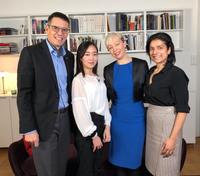
Guide: How to not mess up an Interview with a Nobel laureate (or other important situations)!
When Ms. Raja first asked me to write this blog post about my experience interviewing Nobel laureate Didier Queloz, I instinctively worried about one question: how can I make this interesting for others to read while still keeping it somewhat informational? Hence, like the title suggests, I decided that I will try my best to give you some practical tips on how to effectively handle a nerve-wracking, unfamiliar situation, such as interviewing a very important figure, while still sharing my personal take on the whole experience!
Let me start off by shortly introducing myself. My name is Boertejin Manlai and I’m a natural science student in my third year at IEGS with a burning passion for learning. My future aspirations are to work with safe mechanizations of AI and biotechnological innovations, for a prosperous future of life! I always try to have an open mind to new things, and as a cosmology/astronomy/quantum physics fan, I was incredibly excited when I was able to convince Dr. Heimeier and Ms. Raja to let me interview one of 2019’s Nobel laureates in physics - Didier Queloz! In preparations for the interview, I met up with two amazing women from the Nobel foundation, Olivia and Manisha, who helped me calm my nerves and discuss potential questions to ask Didier Queloz. I obviously did my own research about exoplanets and tried to come up with astronomy related questions, but Olivia also encouraged me to talk about his personal life and myself. Keeping all the tips I had gotten from Olivia and Manisha in mind, the day of the interview finally came.
Long story short, I think that the interview went great! I had no trouble keeping the conversation alive, mostly due to Didier being the kind, intelligent and talkative person that he is, but also because of a few things that I did to prepare myself:
Practice! Although this may seem obvious to some, practice makes you feel more confident about yourself and helps you keep your nerves in check. It also helps you avoid looking unprofessional because you will already know how to act and what to say. Practice being in that new situation with friends, family or by yourself in front of a mirror! Be mindful of what you need to work on and focus on improving those areas.
Lots of research. Whatever new thing you’re doing, please research anything that may be useful to know beforehand! As an example, if you’re interviewing a professor, learn what you can about their contributions to their field. Preparing yourself through learning important information, such as cultural norms or basic concepts, is a way of showing respect and will be very appreciated.
Being grateful and having a healthy mindset. In the end, you cannot always foresee all potential problems that may arise. Therefore it is crucial for your well-being that you’re kind to yourself and have gratitude for all of your privileges. If you struggle to find motivation, think about how overcoming this new experience will help you reach your future goals. Most importantly, you are here and you are doing your best - and that’s what matters!
Overall, this experience helped me step out of my comfort zone and I’m deeply grateful to everyone who made all of this possible. I hope this blog post wasn’t too monotonous and I would be more than happy to answer questions.
Boertejin Manlai